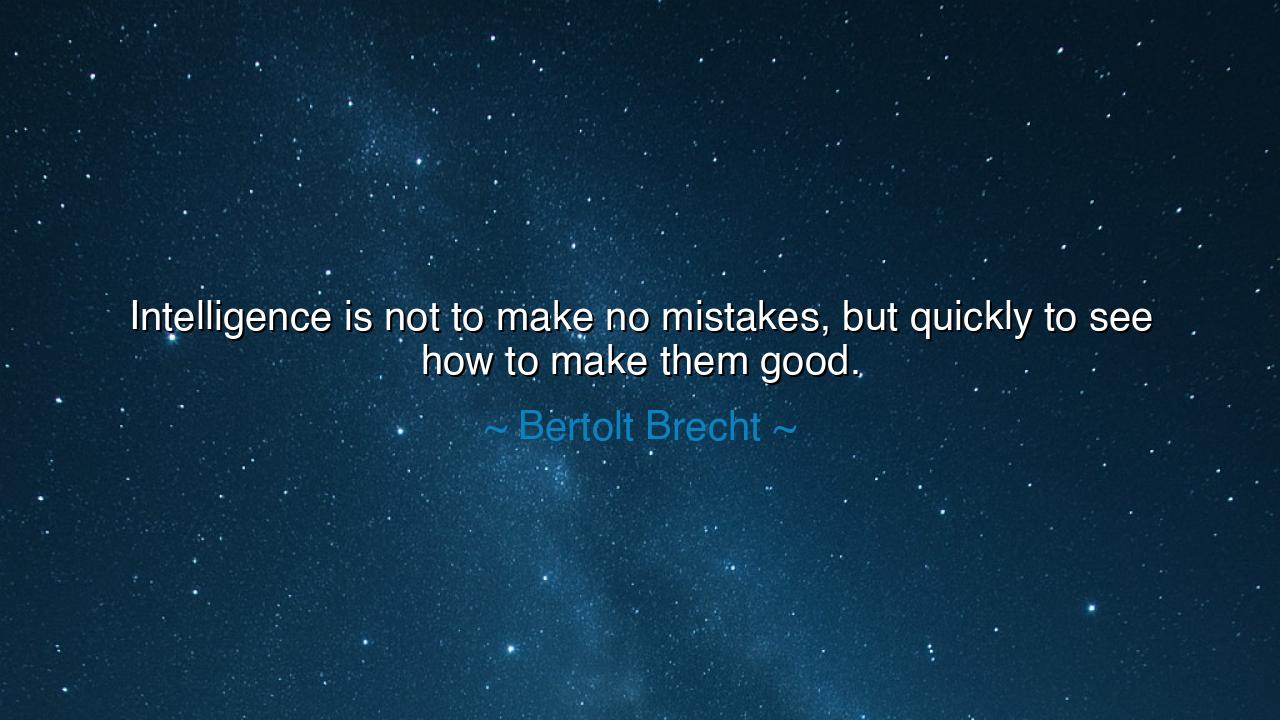
Intelligence is not to make no mistakes, but quickly to see how






The words of Bertolt Brecht — “Intelligence is not to make no mistakes, but quickly to see how to make them good.” — carry the enduring wisdom of one who understood both the frailty and the brilliance of the human spirit. Brecht, the German poet and playwright who lived through the storms of the twentieth century, spoke not as a perfectionist but as a realist — one who had seen how failure and wisdom are woven together like night and dawn. In these words, he unveils the true nature of intelligence: not the sterile pursuit of flawlessness, but the living art of transformation, of turning error into insight and misstep into mastery.
To make no mistakes is beyond human reach. The ancients knew this long before Brecht: even the gods, in their myths, stumbled through pride and passion. What defines humanity is not the absence of fault, but the capacity to learn, to adjust, and to rise higher because of it. True intelligence, Brecht reminds us, is a kind of vision — the ability to look upon failure without despair, to discern the hidden lesson within it, and to use that lesson to build something greater. In this way, every mistake becomes not a chain of shame, but a stepping-stone toward wisdom.
Consider the story of Thomas Edison, the tireless inventor who brought light to the modern world. When asked about his thousands of failed experiments before creating the electric bulb, he replied, “I have not failed. I’ve just found 10,000 ways that won’t work.” His genius was not in avoiding error, but in perceiving error correctly — seeing in each mistake a revelation of what must change. Like Brecht’s teaching, Edison’s life demonstrates that the truly intelligent do not fear to err; they fear only to stop learning. They move through failure as the sculptor through stone, carving shape from imperfection until beauty emerges.
Brecht himself knew this intimately. Living in an age of war, censorship, and exile, he often faced rejection, political hostility, and moral contradiction. Yet through every defeat he adapted — refining his art, his philosophy, and his voice. His theatrical works, which broke the conventions of storytelling, were born from trial and revision, from the willingness to let mistakes guide invention. What began as failure in the eyes of others became the foundation of a new form of theatre — one that sought not to comfort, but to awaken. Thus, Brecht practiced what he preached: he transformed his errors into fuel for creation.
There is deep humility in Brecht’s wisdom. To see how to make mistakes good is to see the world as a teacher, not an adversary. It requires both courage and grace — courage to admit one’s fault, and grace to repair it without resentment. The fool hides his mistakes, fearing judgment; the wise man reveals them, knowing they hold his salvation. In the ancient Chinese philosophy of Lao Tzu, this was called wu wei — the art of flowing with the current rather than fighting against it. Brecht’s words echo this ancient harmony: by accepting the inevitability of error, one gains the freedom to act boldly, to create bravely, and to endure with patience.
This truth applies to every life. In love, in craft, in leadership — we stumble, we misjudge, we fail. But the measure of our intelligence is not in how rarely we fall, but in how swiftly we rise, how honestly we examine what went wrong, and how skillfully we rebuild. Those who cling to pride are broken by their errors; those who embrace humility are remade by them. The world belongs not to the flawless, but to the resilient — to those who can make good of what once went astray.
So, O seeker of wisdom, take this lesson as a lantern for your path: do not fear mistakes. They are the hands of your destiny, shaping you into who you must become. When you err, do not despair; ask instead, “What is this teaching me? How can this be made right?” Let each failure refine your understanding and deepen your compassion. For the wise do not walk unscarred — they walk illuminated by the light of their scars. And in this way, as Brecht teaches, intelligence becomes not the absence of error, but the triumph of learning — the eternal art of turning darkness into dawn.






AAdministratorAdministrator
Welcome, honored guests. Please leave a comment, we will respond soon